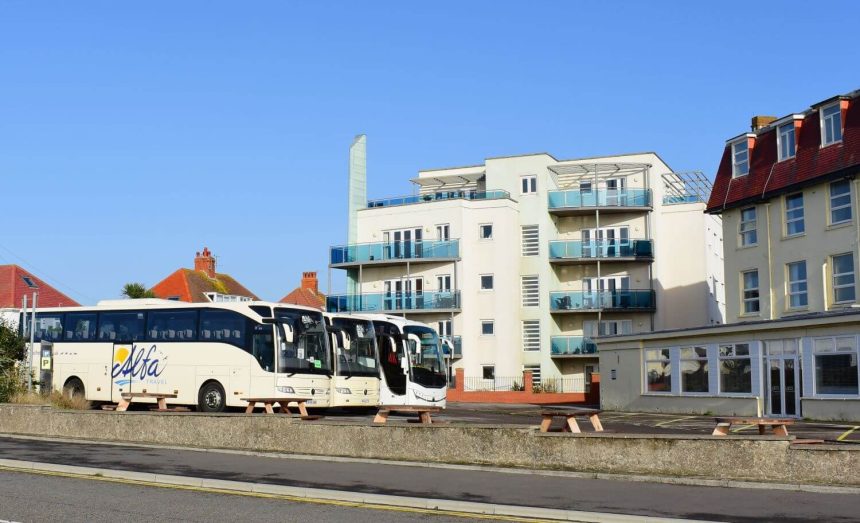As proposals for so-called “tourist taxes” gather steam around the country, coach operators and associations have expressed concern about the effect on their sector.
Last month, Edinburgh City Council set a visitor levy – due to take effect on 24 July 2026 – at 5% of accommodation costs. This was after the Scottish Parliament last year ruled that local authorities could introduce such from April 2026. Similar legislation is planned to be introduced by the Welsh Government from 2027.
Meanwhile, amid press reports that the Treasury is looking into a nationwide roll-out, the UK government has repeatedly said it has no such plans. In England, local authorities do not have the power to directly charge a visitor levy. However, Business Improvement Districts (BIDs) have a legal workaround. Manchester has thus imposed a £1 per night per room visitor charge since 2023.
A similar levy was due to be introduced during 2024 in Bournemouth, Christchurch and Poole (BCP). However, last month the government upheld an appeal that the ballot which led to its introduction should be declared void.
That news was welcomed by Emma Russell, Managing Director of Alfa Leisureplex Group. Its Leisureplex Hotels subsidiary owns a hotel in the BCP area, while another is its coach tour arm, Alfa Travel.
However, Ms Russell is concerned about the threat of wider take-up of tourist taxes. “Several press outlets have reported [the UK government] could be thinking about it,” she says. “Whether it will come in or not I don’t know, but this is our chance to make the noise that it would be a really bad thing, not only for us but for the wider visitor economy.
“I and probably other operators would be more sympathetic to it if it were ringfenced for developing events in areas that we then benefit from. But take the Bournemouth one that is now dead in the water – they wanted to spend over 50% of it on advertising to bring more tourists in. That would not necessarily have benefitted us.”
She points to a September 2023 Tourism Alliance report which noted that tourists in the UK were the second most taxed of 12 destinations compared. “A tourist tax would just push people to go abroad,” Ms Russell adds. She believes that coach operators should be lobbying their MPs now to help ensure that, should any tourist tax legislation be introduced, stipulation should be included regarding appropriate ringfencing.
CTA opposed to tourist taxes
Robert Shaw, Chair of the Coach Tourism Association (CTA), says that some of its hotelier members do not oppose tourist taxes if the funds are ringfenced to improve local tourism facilities.
However, more generally, he adds: “Any tax of this type is regressive, meaning that the poorest pay the highest percentage of their income. Many coach passengers are low earners or have fixed pensions and tourist taxes might impact the market disproportionately.
“It is difficult to understand how the imposition of taxes could help the government achieve its growth targets. It might discourage spending in the UK and encourage more customers to travel abroad where accommodation can offer better value for money.”
Ringfencing call
The Confederation of Passenger Transport is against tourist taxes. UK Coaching Managing Phil Smith adds: “Where tourism taxes cannot be prevented, we argue for ‘hypothecation’ of revenues collected to be re-invested back into tourism infrastructure, which we believe benefits tourists and residents alike because it should result in better facilities like public toilets, for instance.
“This is likely to be a major issue from next year in Scotland where these powers are due to be implemented without the ‘insurance’ of hypothecation.
“However, in England, tourist taxes are being implemented by BIDs and Accommodation BIDs, which at least provide, by default, hypothecation because the overarching local authorities can’t access the proceeds and the BIDs or ABIDs decide how the money is spent.”
Notice needed
UK Coach Operators Association Managing Director Peter Bradley feels after gauging feedback from members in a meeting in January that there would be little objection from the sector if sufficient notice is given, bearing in mind that operators are already planning their 2026 brochures.
“There wasn’t a huge amount of opposition to it,” he says. “We had one or two operators saying it’s discouraging tourism, but most of them saw the sense of it as long as the money that is raised goes on improving facilities for tourism or for coaches.”
Edwards Coaches, which is a prolific organiser of tours in the UK and Europe, believes tourist taxes do not have a negative impact on the sector. Its Director Mike Edwards says: “I don’t think it would have an impact. If it’s a fiver or a tenner on a holiday — our passengers wouldn’t mind.”



























